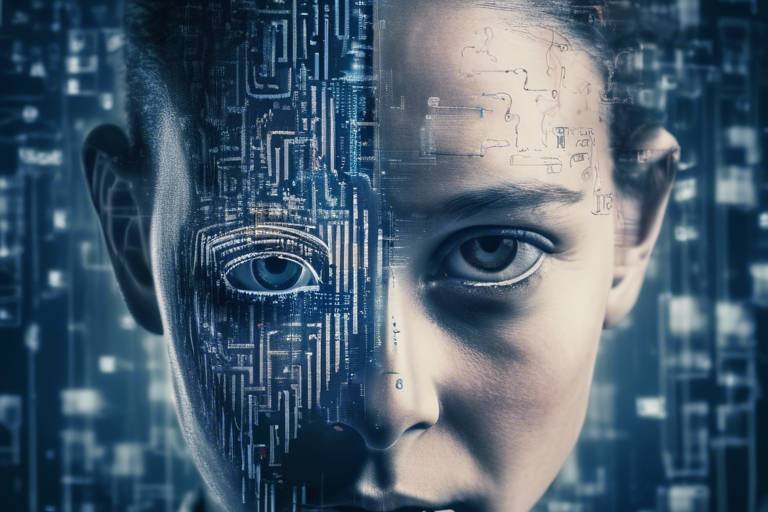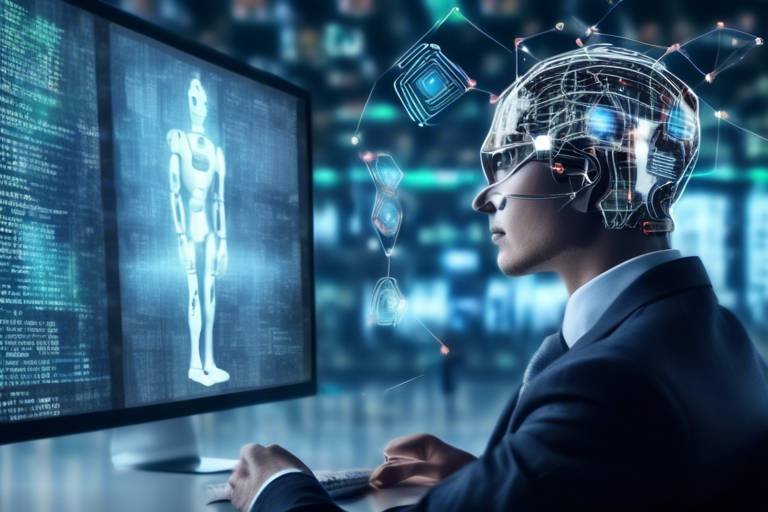The Learning Curve: AI in Online Education
In today's fast-paced world, the integration of artificial intelligence (AI) in online education is not just a trend; it's a revolution. Imagine a classroom where every student receives a personalized learning experience tailored to their unique needs and preferences. This isn't science fiction—it's the reality that AI brings to the educational landscape. From enhancing engagement to driving innovation, AI is reshaping how we learn and teach. So, how exactly is AI transforming online education, and what does the future hold for students and educators alike? Let's dive in!
The increasing integration of AI in educational settings is like the dawn of a new era. With technologies such as machine learning and natural language processing, online education platforms are becoming smarter and more intuitive. These advancements are not merely about automating tasks; they are about creating a dynamic learning environment where technology and education work hand in hand. For instance, AI can analyze vast amounts of student data to identify patterns and trends, enabling educators to make informed decisions that enhance the learning experience.
One of the most significant benefits of AI in education is its ability to provide personalized learning experiences. By analyzing student data, AI can create customized learning paths that cater to individual strengths, weaknesses, and preferences. This tailored approach not only boosts engagement but also improves academic outcomes. Think of it as having a personal tutor available 24/7, guiding you through your educational journey. With AI, students can learn at their own pace, revisiting challenging concepts while advancing through areas they grasp quickly.
At the heart of personalized learning are adaptive learning technologies. These systems utilize AI algorithms to adjust content and assessments in real-time, ensuring that students receive the right level of challenge and support throughout their learning journey. Imagine a learning platform that knows when you're struggling with a math problem and instantly provides additional resources or practice questions to help you grasp the concept. This adaptability is crucial in maintaining student motivation and retention.
The advantages of adaptive learning are numerous. Here are a few key benefits:
- Improved Student Retention: By providing content that matches a student's learning pace, adaptive learning helps keep them engaged and reduces dropout rates.
- Increased Motivation: Personalized challenges lead to a sense of accomplishment, motivating students to continue their studies.
- Efficient Use of Time and Resources: By focusing on areas that need improvement, students can make the most of their study time.
Despite its numerous benefits, implementing adaptive learning technologies comes with its own set of challenges. Issues such as data privacy concerns, the need for robust infrastructure, and the requirement for teacher training can hinder the widespread adoption of these technologies. Educators must be equipped to understand and utilize these tools effectively, ensuring that they enhance rather than complicate the learning experience.
Another exciting development is the rise of AI-driven assessment tools. These tools streamline the evaluation process, providing educators with valuable insights into student performance. By identifying knowledge gaps and facilitating timely feedback, AI helps create a more effective learning environment. Imagine receiving instant feedback on your writing assignment, complete with suggestions for improvement—this is the power of AI in assessment.
As AI becomes more prevalent in education, ethical considerations arise that cannot be ignored. Issues related to bias, data security, and the implications of relying on technology for decision-making in academic settings are critical discussions that need to take place. It's essential to ensure that AI tools are designed and implemented in a way that promotes fairness and transparency.
Looking ahead, the future of AI in online education is filled with promise. Emerging trends and innovations are set to further revolutionize the educational landscape. From enhancing accessibility for students with disabilities to fostering greater engagement through gamification, AI is poised to make learning more inclusive and enjoyable. As we embrace these technologies, one thing is clear: the learning experience for students worldwide will never be the same.
- How does AI personalize learning? AI analyzes student data to create customized learning paths that fit individual needs and preferences.
- What are the benefits of adaptive learning? Benefits include improved retention, increased motivation, and efficient use of resources.
- What challenges does AI face in education? Challenges include data privacy concerns, infrastructure needs, and the necessity for teacher training.
- Are there ethical concerns with AI in education? Yes, issues such as bias and data security are critical considerations in the implementation of AI technologies.

The Rise of AI in Education
The integration of artificial intelligence (AI) in education is not just a trend; it’s a revolution that is reshaping how we learn and teach. Imagine a classroom where every student receives personalized attention tailored to their unique needs, strengths, and weaknesses. This is no longer a distant dream but a reality that is unfolding before our eyes. AI technologies are enhancing learning experiences and driving innovation in online education platforms. From intelligent tutoring systems to automated grading, AI is making waves across educational institutions.
One of the most exciting aspects of AI in education is its ability to analyze vast amounts of data. By leveraging machine learning algorithms, educational platforms can track student performance in real-time, identifying patterns and trends that were previously invisible. This data-driven approach allows educators to make informed decisions, ensuring that no student is left behind. For instance, if a student struggles with a particular concept, AI can recommend additional resources tailored to that individual's learning style, effectively bridging the gap between understanding and confusion.
Moreover, AI is not just about enhancing the learning experience for students; it’s also a boon for educators. Teachers are often overwhelmed with administrative tasks, leaving them little time to engage with students on a personal level. AI can automate routine tasks such as grading and attendance tracking, freeing up valuable time for teachers to focus on what they do best: teaching. This shift allows educators to foster a more interactive and engaging classroom environment, where they can devote their attention to nurturing critical thinking and creativity among their students.
However, the rise of AI in education is not without its challenges. Some educators and institutions may be hesitant to adopt these technologies due to concerns about data privacy and the potential for bias in AI algorithms. It’s crucial for stakeholders to address these issues proactively, ensuring that AI is implemented ethically and responsibly. After all, the goal is to enhance education, not complicate it further.
In conclusion, the rise of AI in education signifies a monumental shift in how we approach learning and teaching. With its potential to personalize learning experiences, streamline administrative tasks, and provide insights into student performance, AI is paving the way for a more effective and engaging educational landscape. As we continue to explore the possibilities of AI, it’s essential to remain vigilant about the ethical implications and challenges that accompany this technological advancement.
- What are the main benefits of AI in education?
AI enhances personalized learning, automates administrative tasks, and provides real-time insights into student performance. - Are there any risks associated with using AI in education?
Yes, there are concerns regarding data privacy, potential biases in AI algorithms, and the need for proper training for educators. - How can AI improve student engagement?
By providing tailored learning experiences and interactive tools, AI can help keep students motivated and actively involved in their education.

Personalized Learning Experiences
In today's fast-paced world, one-size-fits-all approaches to education simply don't cut it anymore. Enter artificial intelligence, a game-changer in the realm of online education. Imagine a classroom where each student receives a learning experience tailored just for them! With AI, this dream is becoming a reality. By analyzing vast amounts of student data, AI can create customized learning paths that align with individual strengths, weaknesses, and preferences. This not only enhances engagement but also leads to improved academic outcomes.
Think of it like a tailored suit—just as a tailor measures your dimensions to create a perfect fit, AI measures your learning style, pace, and areas of difficulty. This personalization helps students feel more connected to their studies, making learning less of a chore and more of an adventure. When students are engaged, they are more likely to absorb information and retain it longer. It’s a win-win!
At the heart of personalized learning experiences are adaptive learning technologies. These systems use sophisticated AI algorithms to adjust content and assessments in real-time. For instance, if a student struggles with a particular math concept, the system can provide additional resources or practice problems tailored to that student's needs. This dynamic approach ensures that every learner receives the right level of challenge and support throughout their journey.
The benefits of adaptive learning are numerous and impactful. Here are some key advantages:
- Improved Student Retention: Personalized content keeps students engaged, which leads to better retention of information.
- Increased Motivation: When students see their progress and receive tailored feedback, they are more motivated to continue learning.
- Efficient Use of Time and Resources: Teachers can focus their efforts on students who need it most, optimizing the learning environment.
These benefits culminate in a more effective educational experience, leading to better academic performance and a deeper understanding of the subject matter.
However, it's not all smooth sailing. Implementing adaptive learning technologies comes with its own set of challenges. One major concern is data privacy. With AI collecting and analyzing personal student data, ensuring that this information is secure is paramount. Additionally, schools must invest in robust infrastructure to support these technologies, which can be a significant financial burden.
Moreover, teachers need proper training and support to effectively utilize these new tools. Without adequate training, the potential benefits of adaptive learning may not be fully realized. It’s crucial for educational institutions to address these challenges head-on to harness the full power of AI in education.
On top of personalized learning experiences, AI-driven assessment tools are revolutionizing how educators evaluate student performance. These tools streamline the evaluation process, allowing teachers to gain invaluable insights into how their students are progressing. By identifying knowledge gaps, educators can provide timely feedback that fosters improvement. This approach not only saves time but also enhances the overall learning experience.
1. What is personalized learning?
Personalized learning is an educational approach that tailors learning experiences to meet individual student needs, preferences, and strengths.
2. How does AI contribute to personalized learning?
AI analyzes student data to create customized learning paths, providing tailored content and assessments that adapt in real-time.
3. What are the benefits of adaptive learning technologies?
Benefits include improved student retention, increased motivation, and a more efficient use of time and resources, leading to better academic performance.
4. What challenges are associated with implementing AI in education?
Challenges include data privacy concerns, the need for robust infrastructure, and the requirement for teacher training and support.

Adaptive Learning Technologies
Imagine a classroom where every student receives a tailored learning experience, one that adapts to their individual needs and preferences. are making this dream a reality. These innovative systems leverage complex AI algorithms to adjust educational content and assessments in real-time, ensuring that each learner is challenged just enough to keep them engaged without feeling overwhelmed. This is like having a personal tutor available 24/7, guiding students through their educational journey.
At the heart of adaptive learning is the ability to analyze vast amounts of data. When students interact with online platforms, their responses, engagement levels, and even the time spent on various tasks are tracked. This data is then processed to create a personalized learning path that aligns with each student's unique strengths and weaknesses. For example, if a student struggles with a particular math concept, the system can provide additional resources and exercises focused on that area, while simultaneously advancing others who have mastered the material. It's a dynamic approach that transforms the one-size-fits-all model of education into a more individualized experience.
One of the most exciting aspects of adaptive learning technologies is their ability to foster self-directed learning. Students can take charge of their education, progressing at their own pace. This autonomy not only boosts motivation but also encourages a growth mindset, where learners understand that challenges are part of the journey. Moreover, as they receive immediate feedback on their performance, learners can adjust their strategies and approaches in real-time, leading to deeper understanding and retention of knowledge.
However, it's essential to recognize that the implementation of these technologies isn't without its challenges. For instance, educational institutions must invest in robust infrastructure to support adaptive learning systems, ensuring they can handle the data processing and analytics required. Additionally, educators need proper training to effectively integrate these tools into their teaching practices. Without this support, the full potential of adaptive learning might not be realized.
In summary, adaptive learning technologies are revolutionizing the way students engage with educational content. By providing personalized learning experiences that adapt to individual needs, these systems not only enhance student engagement but also improve academic outcomes. As we move forward, embracing these technologies could be the key to unlocking the full potential of every learner in the digital age.
- What are adaptive learning technologies? Adaptive learning technologies are systems that use AI algorithms to personalize educational content and assessments based on individual student data.
- How do these technologies benefit students? They provide tailored learning experiences, enhance engagement, and improve academic performance by addressing each student's unique strengths and weaknesses.
- What challenges are associated with implementing adaptive learning? Challenges include data privacy concerns, the need for robust infrastructure, and the requirement for teacher training and support.

Benefits of Adaptive Learning
Adaptive learning is not just a buzzword; it's a game changer in the realm of education. Imagine walking into a classroom where the lessons are tailored just for you, adapting in real-time to your needs. This is precisely what adaptive learning offers. By leveraging artificial intelligence, it creates a personalized educational experience that fits each student's unique learning style. One of the most significant benefits of adaptive learning is its ability to improve student retention. When students engage with material that resonates with their individual strengths and weaknesses, they are more likely to absorb and retain the information.
Furthermore, adaptive learning systems can significantly increase motivation. When students see that their learning path is designed specifically for them—challenging yet achievable—they are more inclined to stay engaged. This personalized approach can lead to a more profound understanding of the subject matter, as students aren't just passively consuming information; they are actively participating in their educational journey.
Another noteworthy advantage is the efficient use of time and resources. Traditional teaching methods often involve a one-size-fits-all approach, which can leave some students bored and others overwhelmed. Adaptive learning technology allows educators to focus their efforts where they are most needed, ensuring that students receive the appropriate level of challenge and support. This not only helps in better academic performance but also allows teachers to allocate their time to more meaningful interactions with students.
To illustrate, consider the following table that highlights the key benefits of adaptive learning:
| Benefit | Description |
|---|---|
| Improved Retention | Students retain information better when lessons are tailored to their needs. |
| Increased Motivation | Personalized challenges keep students engaged and eager to learn. |
| Efficient Resource Use | Teachers can focus on areas where students need the most help, optimizing their time. |
In addition to these benefits, adaptive learning fosters a sense of independence among students. They learn to take charge of their educational journey, making decisions about their learning paths. This empowerment can lead to a more profound appreciation of the learning process, as students begin to understand that education is not just about passing tests but about acquiring knowledge and skills that will serve them throughout their lives.
In conclusion, the benefits of adaptive learning are vast and varied. From improved retention and motivation to efficient use of resources and fostering independence, the impact of this innovative approach to education is nothing short of revolutionary. As we continue to embrace technology in education, adaptive learning stands at the forefront, ready to transform the way we teach and learn.
- What is adaptive learning? Adaptive learning is an educational method that uses technology to tailor learning experiences to individual student needs.
- How does adaptive learning improve retention? By providing personalized content that matches a student's learning style, adaptive learning enhances understanding and memory retention.
- Are there any challenges associated with adaptive learning? Yes, challenges include data privacy concerns and the need for teacher training.
- Can adaptive learning be applied in all subjects? Absolutely! Adaptive learning can be integrated across various subjects, making it a versatile educational tool.

Challenges of Implementation
Implementing AI technologies in online education is not without its hurdles. While the potential benefits are immense, several challenges can impede the effective integration of these advanced systems. One major concern is data privacy. As educational institutions collect and analyze vast amounts of student data to tailor learning experiences, safeguarding this information becomes crucial. Students and parents alike are understandably apprehensive about how their data will be used and stored, raising questions about transparency and consent.
Another significant challenge is the need for robust infrastructure. Many educational institutions, particularly those in underfunded areas, may lack the necessary technological framework to support sophisticated AI applications. This disparity can lead to a digital divide, where only a select few institutions can leverage the full potential of AI, leaving others behind. It's akin to having a high-performance sports car but not having the right roads to drive it on; the technology exists, but without the proper infrastructure, its effectiveness is severely limited.
Furthermore, the requirement for teacher training cannot be overlooked. Educators play a pivotal role in the successful implementation of AI in the classroom. However, many teachers may feel overwhelmed or underprepared to utilize these new tools effectively. Without adequate training and support, even the most advanced AI systems can fall flat, failing to enhance the learning experience as intended. This is where professional development programs come into play, ensuring that teachers are equipped not only with the technical know-how but also with the confidence to integrate AI into their teaching practices.
Lastly, there is the issue of resistance to change. Many educators and institutions may be hesitant to adopt AI-driven solutions, preferring traditional methods that they are comfortable with. This resistance can stem from a lack of understanding of AI's capabilities or fear of the unknown. It’s essential for stakeholders to engage in open dialogues about the benefits of AI, showcasing real-world examples of successful implementations to alleviate concerns and foster a culture of innovation within educational settings.
In summary, while the integration of AI into online education holds great promise, overcoming these challenges is essential for realizing its full potential. By addressing data privacy, investing in infrastructure, providing comprehensive teacher training, and promoting a positive attitude towards change, educational institutions can pave the way for a more effective and inclusive learning environment.
- What are the main challenges of implementing AI in education?
Data privacy, infrastructure needs, teacher training, and resistance to change are the primary challenges. - How can institutions address data privacy concerns?
By adopting transparent data management practices and ensuring compliance with regulations. - Why is teacher training important for AI integration?
Teachers need to be comfortable and knowledgeable about AI tools to effectively enhance student learning. - What role does infrastructure play in AI implementation?
A robust technological framework is essential for supporting advanced AI applications in education.

AI-Driven Assessment Tools
In the rapidly evolving landscape of online education, are becoming indispensable for both educators and students. Imagine a world where grading is not just a tedious task but an insightful process that helps shape learning experiences. With the power of artificial intelligence, this vision is becoming a reality. These tools leverage advanced algorithms to evaluate student performance with remarkable accuracy, providing educators with deep insights into individual learning trajectories.
One of the most significant advantages of AI-driven assessment tools is their ability to identify knowledge gaps in real-time. Traditional assessments often provide a snapshot of a student's understanding at a single moment, but AI tools can analyze patterns over time. For instance, if a student struggles with specific math concepts repeatedly, the AI can flag this issue and suggest targeted resources or interventions. This level of detail allows teachers to tailor their approach, ensuring that no student is left behind.
Moreover, these tools facilitate timely feedback, which is crucial for student improvement. Imagine receiving instant feedback on an assignment rather than waiting days for a teacher to grade it. AI assessment tools can provide immediate insights, helping students understand their mistakes and learn from them right away. This not only boosts engagement but also fosters a growth mindset, encouraging learners to see challenges as opportunities for improvement.
However, the implementation of AI-driven assessment tools is not without its challenges. One major concern is the accuracy of the algorithms used. If the data fed into these systems is biased or flawed, the outcomes can be misleading. Educators must remain vigilant, ensuring that the tools are used as a supplement to, rather than a replacement for, human judgment. Additionally, privacy issues surrounding student data are paramount. Schools and institutions must prioritize data security to protect sensitive information while reaping the benefits of AI.
To illustrate the impact of AI-driven assessment tools, let's take a look at a simple comparison:
| Traditional Assessment | AI-Driven Assessment |
|---|---|
| Delayed feedback | Instant feedback |
| Generalized results | Personalized insights |
| Static evaluation | Dynamic tracking of progress |
| Limited data analysis | Comprehensive performance analytics |
As we move forward, the integration of AI-driven assessment tools will likely continue to grow, reshaping how educators approach evaluation and feedback. With the right balance of technology and human oversight, these tools hold the potential to enhance the educational experience, making it more personalized and effective for every learner.
- What are AI-driven assessment tools? These are technology solutions that use artificial intelligence to evaluate student performance and provide feedback.
- How do these tools benefit educators? They offer insights into student learning patterns, help identify knowledge gaps, and provide immediate feedback.
- Are there any challenges in using AI assessment tools? Yes, concerns include algorithm accuracy, bias in data, and privacy issues related to student information.
- Can AI replace traditional assessments? While AI tools enhance assessment, they should complement human judgment rather than replace it.

Ethical Considerations
As we dive deeper into the world of artificial intelligence in education, we must confront a myriad of that come hand in hand with this technological revolution. While AI holds the promise of transforming learning experiences, it also raises critical questions about fairness, privacy, and the integrity of educational processes. Have you ever wondered what happens to your data when you use an AI-driven learning platform? This is just one of the many concerns that educators, students, and policymakers must address.
One of the most pressing issues is bias. AI systems are only as good as the data they are trained on. If the data reflects historical biases, the AI can perpetuate these inequalities in educational settings. For instance, an AI tool designed to assess student performance might unfairly disadvantage certain groups if the underlying data lacks diversity. This can lead to a cycle of underrepresentation and misrepresentation in academic achievements. Thus, it's essential for developers to ensure that their data sets are comprehensive and representative.
Another significant concern is data security. With the increasing reliance on AI, vast amounts of personal information are being collected from students. This data can include everything from academic performance to personal preferences. Schools and educational institutions must prioritize the protection of this sensitive information to prevent breaches that could expose students to various risks, including identity theft and privacy violations. As we embrace AI, we must also establish robust frameworks to safeguard student data.
Moreover, the reliance on AI for decision-making in educational contexts raises questions about accountability. When an AI system determines a student's learning path or evaluates their performance, who is responsible for the outcomes? If a student is misjudged or unfairly assessed, it can have lasting impacts on their educational journey. Educators and institutions need to maintain a balance, ensuring that while AI can provide valuable insights, human oversight remains a crucial component in the educational process.
In addition to these concerns, there are implications for teacher roles. As AI takes on more responsibilities, there is a fear that it could diminish the role of educators. However, rather than replacing teachers, AI should be viewed as a tool that empowers them. Educators should be trained to leverage AI effectively, using it to enhance their teaching methods and provide personalized support to students. This symbiotic relationship can lead to a more enriched educational experience.
In summary, while the integration of AI into online education offers exciting possibilities, it is crucial to navigate these ethical considerations with care. Addressing bias, ensuring data security, clarifying accountability, and redefining teacher roles are essential steps in creating an equitable and effective educational landscape. As we move forward, we must engage in ongoing discussions about these issues, ensuring that technology serves to enhance, rather than hinder, the learning experience.
- What are the main ethical concerns regarding AI in education? The main concerns include bias in AI algorithms, data privacy and security, accountability for AI-driven decisions, and the evolving role of educators.
- How can we ensure that AI systems in education are fair? By using diverse and comprehensive data sets for training AI and regularly auditing these systems for bias.
- What measures can be taken to protect student data? Implementing robust data security protocols and ensuring compliance with privacy regulations are essential to safeguard student information.
- Will AI replace teachers in the classroom? No, AI is intended to complement teachers, providing them with tools to enhance their teaching and support students more effectively.

The Future of AI in Online Education
As we gaze into the horizon of education, it's clear that the integration of artificial intelligence is not just a fleeting trend—it's a transformative wave that is reshaping the landscape of online learning. Imagine a classroom where every student's unique learning style is catered to, where lessons adapt in real-time to their needs, and where educators are empowered with insights that were previously unimaginable. This is the future that AI promises for online education.
One of the most exciting prospects is the potential for enhanced accessibility. AI can break down barriers for students with disabilities, providing tailored resources that accommodate their specific requirements. For instance, text-to-speech technology can assist visually impaired students, while AI-driven applications can offer real-time translation for non-native speakers, making learning more inclusive than ever before.
Moreover, the role of virtual reality (VR) and augmented reality (AR) in online education is expanding, thanks to AI. Imagine stepping into a historical event or exploring the human body in 3D—all from the comfort of your home. These immersive experiences can significantly enhance engagement and retention, making learning not just a task, but an adventure.
However, as we venture further into this AI-driven educational landscape, we must also consider the implications of data privacy and security. With AI systems collecting vast amounts of data to personalize learning experiences, ensuring that this information is safeguarded is paramount. Educational institutions will need to adopt stringent policies and technologies to protect student data, fostering a safe learning environment.
Another key aspect of the future of AI in education is the collaboration between humans and machines. Rather than replacing educators, AI is set to become a powerful ally. Teachers will have more time to focus on what they do best—mentoring and inspiring students—while AI handles administrative tasks and data analysis. This partnership can lead to a more enriching educational experience, where technology and human insight work hand in hand.
As we look ahead, it's essential to stay informed about the emerging trends in AI technology that are poised to impact online education. Here are some trends to watch:
- Predictive Analytics: Leveraging data to forecast student performance and intervene proactively.
- Gamification: Incorporating game-like elements to make learning more engaging and motivating.
- AI Chatbots: Providing 24/7 support for students, answering queries, and guiding them through their learning paths.
In conclusion, the future of AI in online education is bright and filled with possibilities. As we embrace these innovations, we must also remain vigilant about the ethical considerations that accompany them. By doing so, we can create a more effective, engaging, and equitable educational environment for all students.
- What are the main benefits of AI in online education?
AI enhances personalization, accessibility, and efficiency in learning, allowing students to engage with content that is tailored to their individual needs. - How does AI improve student engagement?
By utilizing adaptive learning technologies and immersive experiences, AI makes learning more interactive and enjoyable. - What are the ethical concerns surrounding AI in education?
Issues related to data privacy, bias in algorithms, and the potential for over-reliance on technology are significant considerations that need to be addressed. - Will AI replace teachers in the future?
No, AI is designed to assist teachers, not replace them. The human element of teaching is irreplaceable.
Frequently Asked Questions
- How is AI transforming online education?
AI is revolutionizing online education by providing personalized learning experiences, enhancing engagement, and streamlining administrative tasks. With its ability to analyze vast amounts of data, AI tailors educational content to meet individual student needs, making learning more effective.
- What are personalized learning experiences?
Personalized learning experiences are tailored educational paths that AI creates for each student based on their unique strengths, weaknesses, and preferences. This customization helps students stay engaged and improves their overall academic outcomes.
- What are adaptive learning technologies?
Adaptive learning technologies use AI algorithms to adjust the difficulty of content and assessments in real-time. This ensures that students are always challenged at the right level, receiving support when needed, which ultimately enhances their learning journey.
- What are the benefits of adaptive learning?
The benefits of adaptive learning include improved student retention, increased motivation, and a more efficient use of time and resources. This approach leads to better academic performance as students receive personalized support tailored to their learning needs.
- What challenges come with implementing AI in education?
Implementing AI in education presents challenges such as data privacy concerns, the necessity for robust infrastructure, and the need for teacher training and ongoing support. Addressing these challenges is crucial for the successful integration of AI technologies in educational settings.
- How do AI-driven assessment tools work?
AI-driven assessment tools analyze student performance data to provide educators with insights into knowledge gaps and strengths. This allows for timely feedback and targeted interventions, making the evaluation process more efficient and effective.
- What ethical considerations should be taken into account?
As AI becomes more prevalent in education, ethical considerations such as bias, data security, and the reliance on technology for decision-making in academic settings must be addressed. Ensuring fairness and transparency in AI applications is essential for maintaining trust in educational systems.
- What does the future hold for AI in online education?
The future of AI in online education looks promising, with emerging trends and innovations that aim to enhance accessibility, engagement, and the overall learning experience. As technology continues to evolve, we can expect even more transformative changes in how education is delivered and experienced worldwide.



















